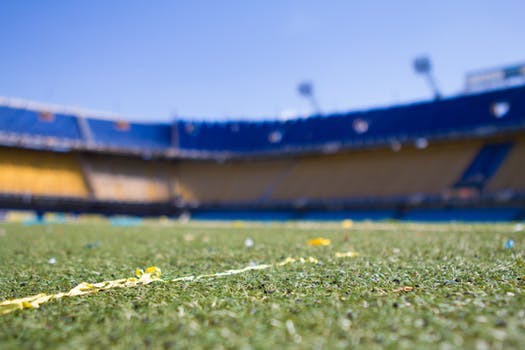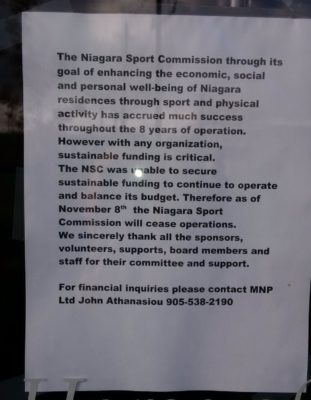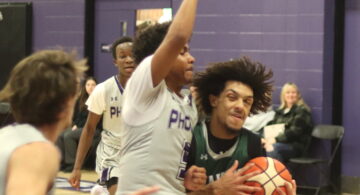
Niagara Sports Commission closes its doors
A local agency that has helped bring millions of sports tourism dollars to Niagara has ceased operations.
“The Niagara Sports Commission, through its goal of enhancing the economic, social and personal well-being of Niagara residences through sport and physical activity has accrued much success throughout the eight years of operation,” read a notice on the door at the commission’s Pine Street office in Thorold.
“However with any organization, sustainable funding is critical. The NSC was unable to secure sustainable funding to continue to operate and balance its budget.
 Therefore, as of Nov. 8, the Niagara Sports Commission will cease operations.
Therefore, as of Nov. 8, the Niagara Sports Commission will cease operations.
“We sincerely thank all the sponsors, volunteers, supports, board menbers and staff for their committee and support.
At the end of the notice, people with financial inquiries are told to contact MNP Ltd. John Athanasiou. Athanasiou is a licensed insolvency trustee based out of Burlington. Insolvency trustees are federally regulated professionals who provide advice and services to individuals and businesses with debt problems.
“I don’t really have any comment,” said Bram Cotton, who served as the commission’s executive director since 2012. “It was a decision by the board of directors and that’s all I have to say.”
Including Cotton, the commission had three full-time employees.
Reached Wednesday, Henry D’Angela, the chair of the NSC’s board at the time of its demise, reiterated what the notice said.
“It didn’t have sustainable funding,” D’Angela said. “We never had funding and we always struggled with sustainable funding.”
The commission was funded mainly through event management of local competitions such as the Henley regatta, partnerships, sponsorship, consulting, and public-sector grants used to run specific community programs or projects. In 2011, the commission had an operational budget of less than $190,000.
The commission received money from Regional Niagara for specific projects such as the Canada Games bid and when the rowing and canoe/kayak events for the Pan Am Games were staged in Niagara in 2015. According to on-line Regional Niagara budget documents, the commission received $85,000 in 2016. Prior to that year, the commission received $70,000 a year for five years to act as a liaison between the region and the Pan Am Games committee.
With the demise of the commission, it will be up to other groups to continue to push sports tourism in Niagara.
“It will probably fall back on the municipalities,” D’Angela said. “I’m not sure if the region’s economic development will pick up any of that; maybe for some of the larger Games potentially. I’m not so sure where that is going to fall.”
D’Angela agreed it was tough to close the commission down considering all the money it helped bring into the region.
“You have to have enough funding to make sure your bills are paid also,” he said.
The Niagara Sports Commission in partnership with Basketball Canada is scheduled to stage the FIBA U18 Boys America Championship for basketball at the Meridian Centre next June.
According to sources, the event, which is projected to have a $4 million economic benefit to Niagara, shouldn’t be jeopardized by the commission’s untimely end.
“There will probably be some discussions with Basketball Canada to see how that actually translates itself out,” D’Angela said “I am not privy to those conversations so I am not sure what is going on with that.”
One organization that is sad to see end of the commission was the Royal Canadian Henley Regatta.
“I always had a lot of hope that the sports commission would survive,” said Henley commissioner Bill Schenck,. “The Henley used it since 2012 and it became something I relied on quite heavily organizing the event.”
The commission played a key role in organizing and managing the 300 or so volunteers required to stage the regatta.
“People still want to volunteer, but they only want to do it for three hours at a time,” he said. “To do the long-term stuff like setting committees up and contacting people, that’s where the sports commission really fit in for us.”
In the bigger picture, Schenck has seen the sports commission lure a lot of major sporting events to Niagara.
“They certainly did with the junior hockey and some of the basketball stuff,” he said. “There was an opportunity that was missing and it took a while for everyone to see the benefits of having these events here.
“There was nobody bringing those events and it took a dedicated force to make that happen.”

























